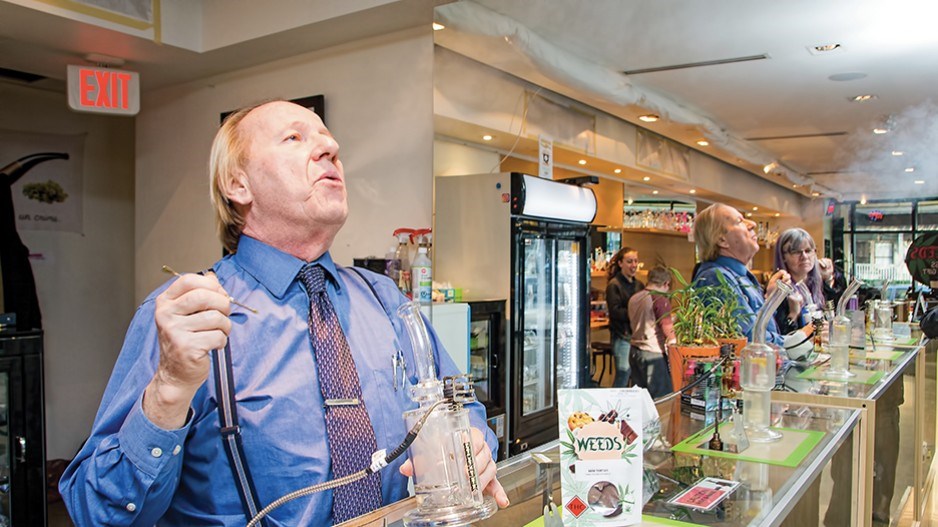The list of ailments that can supposedly be treated by marijuana is endless: everything from carpal tunnel syndrome and insomnia to Crohn’s disease and arthritis, even cancer
Dr. M-J Milloy, a scientist with the BC Centre on Substance Use, who is also an assistant professor in the division of AIDS, department of medicine, at the University of British Columbia, however, says the clinically proven list of treatments for medical marijuana is quite short. Health Canada has only green-lighted cannabis (or cannabinoids, which include THC) as an appetite stimulant for anorexia caused by chemotherapy; for muscle spasms associated with multiple sclerosis; and for anorexia caused by HIV-AIDS.
Milloy – an infectious disease epidemiologist who has done research on the effects of cannabis for those living with HIV-AIDS or addiction – says he can’t see a lot of seniors falling into the designated Health Canada categories for approved treatment.
“The other end of this is what people are actually using cannabis for therapeutically,” he says. “These are conditions which don’t have the same kind of rigorous evidence or approvals granted, but we know a lot of people are doing it with varying levels of effectiveness.”
Milloy says relieving arthritis pain is probably the most common use for marijuana among seniors. Statistics Canada estimates approximately 4.8 million Canadians suffer from various forms of arthritis, most commonly seen in people 40 years or older. Milloy says marijuana appears to offer relief for many, and noted when it comes to arthritis, the medical community does not have a definitive “magic bullet treatment.”
“Certainly we’ve heard from a variety of different sources, including Health Canada, that there are a lot of seniors out there who are trying cannabis or are using cannabis for arthritis and other related conditions such as pain management and insomnia,” Milloy says.
Jeff Simpson, 83, started using marijuana in his late 50s when he was diagnosed with a form of rheumatoid arthritis in his spine. His story echoes one that is common within the medical community. Simpson originally went to his doctor asking for relief, and was prescribed medication that came with a host of side effects.
“The drugs that my doctor had always prescribed for me were really pretty awful,” says the Vancouver businessman and university student. “They gave me really terrible liver problems, stomach problems, intestinal problems. I just kept saying to my doctor that I didn’t like the stuff, it makes me feel awful. And so a friend of mine says I should try marijuana and see if it helps.”
Simpson went out on the street and bought some marijuana and found it quite useful for pain relief so he could go about his daily schedule. Since then, he says, marijuana has gotten much better and he’s now stopped using any pharmaceuticals to treat his arthritis. Simpson says that even after he went back to his doctor and said marijuana was helping him with pain symptoms, his doctor was skeptical and even dismissive.
“I says, ‘It’s helping, it’s really, really helping.’ And my doctor says, ‘It’s just your imagination.’”
Simpson — who owns his own business and is completing his PhD in astrobiology — says he smokes about a gram a day (approximately two or three joints). When he first started using regularly he would get hungry; however, the feelings have passed, he says.
In terms of advice for seniors who might be thinking of trying marijuana for medical purposes, both Simpson and Milloy say heading to your doctor is probably not the best first choice.
“I would say talk to a friend who uses it,” says Simpson. “And the first time you try it, don’t try it alone; use it with someone you trust because there are cognitive issues for sure.”
Don Briere, 66, president of Weeds Glass and Gifts Ltd., which has 17 pot dispensary shops across Canada, according to its website, estimates that close to 30 per cent of the people who come into his shop are 55 or over.
“[Seniors] have more aches and pains than young people,” he says, noting arthritis is a common ailment mentioned by seniors who come to his shops. “Also, people who are older and active or who play hockey or something along those lines, looking for pain management.”
Briere notes some seniors are more comfortable taking topical forms of marijuana, which means there is no effect on the brain. He adds that liquid forms of straight THC are also popular, which means marijuana can be consumed without being smoked.
Mario Canseco, vice-president of public affairs for survey firm Insights West, says seniors (55 and older) are on par with the provincial average regarding support for the legalization of recreational marijuana, which the federal government plans to introduce legislation on this July.




